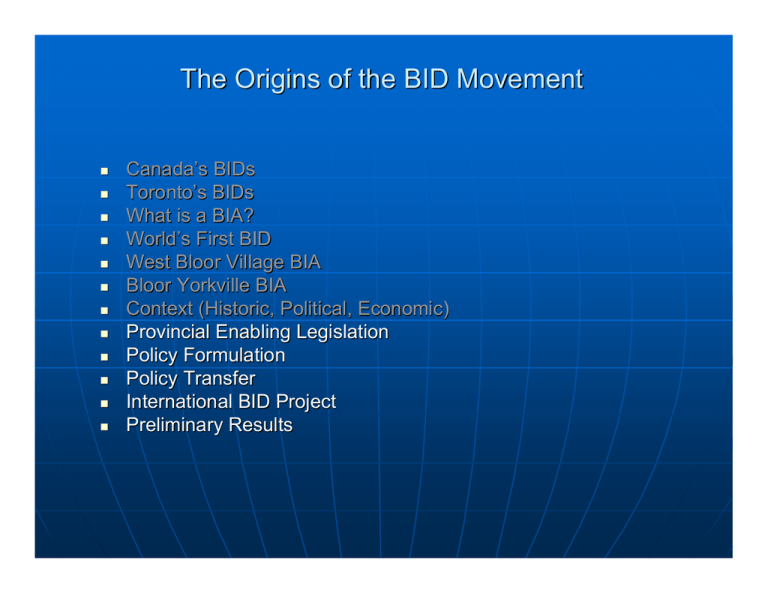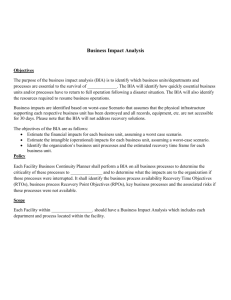The Origins of the BID Movement
advertisement

The Origins of the BID Movement Canada’s BIDs Toronto’s BIDs What is a BIA? World’s First BID West Bloor Village BIA Bloor Yorkville BIA Context (Historic, Political, Economic) Provincial Enabling Legislation Policy Formulation Policy Transfer International BID Project Preliminary Results Provincial Enabling Legislation Legislation BIA typically originates with a group of interested business people The BIA Office at Toronto City Hall can provide assistance Steering committee forms to propose program and budget City staff assesses the proposed budget and calculates levy Committee calls a meeting to explain how a BIA works City Clerk’s office mails notice to all businesses within proposed BIA Businesses have two months to respond City Council will enact a By-law proclaiming the new BIA Designation is rejected if one-third of the assessed land value object Board of Management (BM) is elected and appointed BM submits a budget City Council passes a Levying By-law Levies may be collected from members by City's Finance Dept. Provincial Enabling Legislation How does a BIA operate? Administered by a volunteer Board of Management (BM) BMs are elected by BIA members, approved by City Council Each year the BM proposes a program of activities and a budget budget BIA Members Board of Management (BM) City Council Provincial Enabling Legislation How is an individual member’s levy determined? Every business member is charged a share of the annual budget, based on that member's share of the BIA's total commercial realty assessment. If a business's commercial realty assessment is $6,000, and the total commercial realty assessment of all businesses in the BIA is $2,000,000, and the BIA's annual budget is $100,000, then that business's BIA levy is: $6,000 X $100,000/$2,000,000= $300 Currently the average Toronto BIA member is assessed a levy of slightly over $300 per year. Which actors were instrumental in the process of policy formulation? Formulation Members of the Bloor-Jane-Runnymede Businessmen’s Association City of Toronto Planning Board City Surveyors Department City Real Estate Dept Department of Public Works City Legal Department Department of Streets Metro Roads and Traffic Department The Parking Authority of Toronto Development Department Council of the City of Toronto Toronto Transit Commission Toronto Hydro Electric Commission Ontario Hydro Which actors were instrumental in the process of policy transfer? Transfer “The Bloor West Village concept was presented to a seminar of the Canadian Association of Renewal Officials in Toronto on Nov. 26th, 1971.” “Even after his retirement, he [Neil McLellan] traveled across the province and the country preaching the BIA gospel.” Formed in 1980, the Toronto Association of Business Improvement Areas (TABIA) is a formalized organization that began by promoting BIAs and now works with Provincial and City Government (BIA Office in City Hall) on legislation International BID Project Project Principal Investigator, Prof. Hoyt Funding from HASS Fund Support from the International Downtown Association Staff: Devika Gopal, Todd Leiberman, Shanana Chataraj, and and Noriko Komiyama Komiyama Methodology: Identification, Survey, and Site Visit August 2002 – May 2003 To critically evaluate… (1) this new form of urban governance, (2) the origin, distribution and evolution of BID policy, (3) the role of business in revitalizing urban areas and (4) innovative efforts to improve the pedestrian experience Preliminary Results Canada… 333 organizations successfully identified Response rate = 26% Toronto… Toronto… 41 organizations successfully identified identified Response rate = 20% How do these organizations vary? BIAs BIDs Number Identified 347 404 Formed Before 1990 73% 13% Budget $3 Thousand to $2 Million $8 Thousand to $15 Million Size 2-125 Blocks 1-300 Blocks Performance Evaluation 33% 54%


